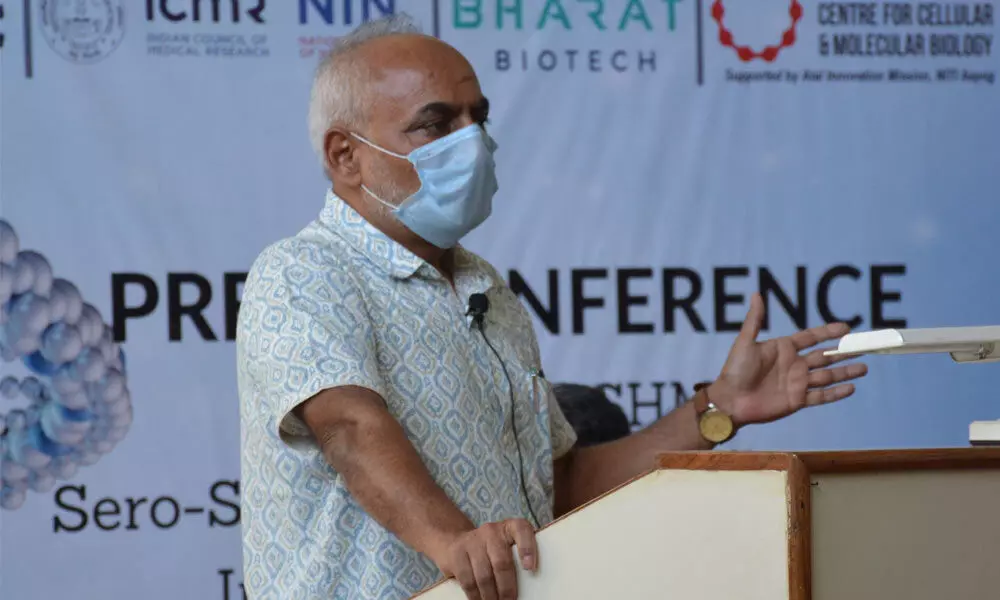Live
- Officials inspect arrangements for CM’s visit
- Iran: 1 killed, 21 injured after bus overturns
- Welfare hostels shut as bills pile up
- CM Revanth Reddy Slams BJP Leaders Over Inaction
- Minister Ponguleti visits Basara temple
- Ashutosh Gowariker to lead International Jury at IFFI 2024
- The global challenges of greener aviation
- Shreyas Media secures exclusive advertising rights for ‘MahaKumbh Mela 2025’
- Experience the journey of art
- Seven iconic ghats undergo makeover for Mahakumbh
Just In
Hyderabad: Antibodies in more than half of citizens


CCMB Director Dr Rakesh Mishra addressing the media on antibodies against corona virus in Hyderabad on Thursday
Seroprevalence study indicates 54% residents exposed to coronavirus
Hyderabad: Is Hyderabad slowly moving towards herd immunity? The answer could be a big 'Yes' if the latest seroprevalence survey conducted by CSIR, Centre for Cellular and Molecular Biology (CCMB), ICMR – National Institute of Nutrition (NIN) and Bharat Biotech is any indication.
The survey was aimed at estimating the seroprevalence of antibodies against the coronavirus in Hyderabad. It has indicated that around 54 per cent of the city's residents have developed antibodies against SARS-CoV-2, indicating prior exposure to the corona virus.
Disclosing the details, CCMB Director Rakesh Mishra and NIN Director Dr R Hemalatha said they have checked over 9,000 samples for antibodies against the virus in people from across 30 wards of Hyderabad. At least 300 people from each ward were selected for the purpose and all of them were above 10 years of age.
This study brings a comprehensive perspective of the potentially protective immune response against the coronavirus in the city's population. The data indicates that the population of Hyderabad might be slowly moving towards herd immunity, which will be certainly accelerated by the ongoing vaccination effort," the CCMB Director said.
Most of the wards showed a similarly uniform range of seroprevalence from 50-60 per cent. A few wards showed as much as 70 per cent or as low as 30 per cent seroprevalence. Rakesh said that women showed a marginally higher seropositivity rate (56 per cent) than men (53 per cent). Those above 70 years of age showed lower seropositivity (49 per cent), possibly because of limited mobility and extra care taken by older individuals during the pandemic.
The seropositivity in families where Covid-19 positive cases were reported was as high as 78 per cent. This was followed by those with known Covid-19 contacts outside their household (68 per cent).
NIN scientist Dr A Laxmaiah observed that having a larger number of rooms in houses and a small family size had a low prevalence of coronavirus infection. "This multistage random sampling study on 9,000 people in the city of Hyderabad showed that more than 75 per cent of the seropositive population did not know that they had contracted coronavirus infection in the past. This suggests seroconversion, that is antibody formation has happened even with silent infections.

© 2024 Hyderabad Media House Limited/The Hans India. All rights reserved. Powered by hocalwire.com






